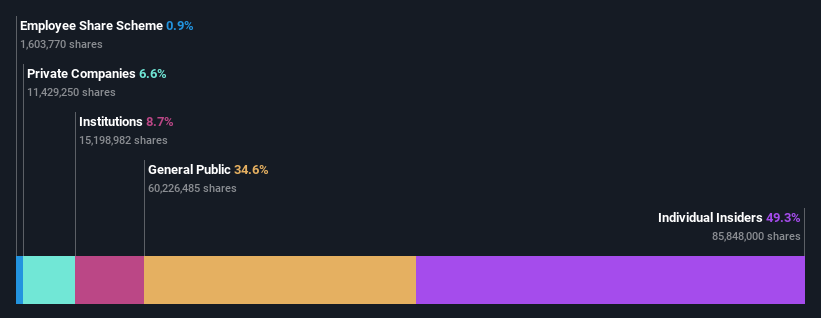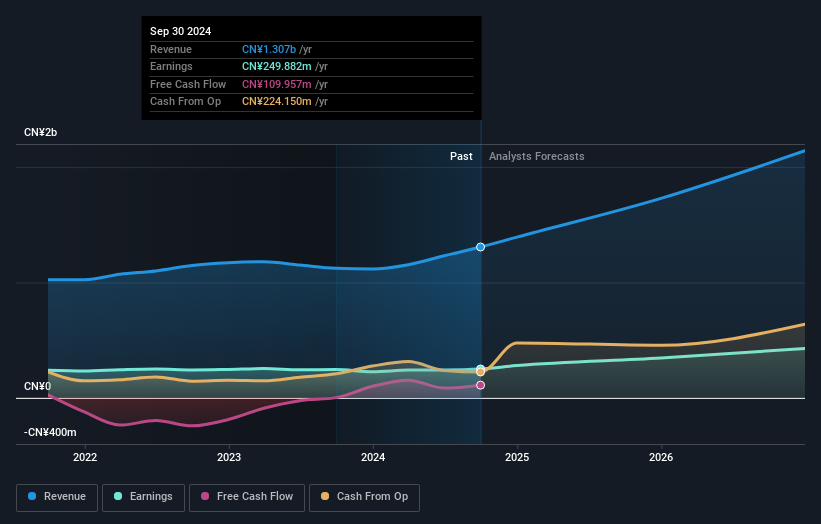Recent 6.4% pullback would hurt Chengdu Easton Biopharmaceuticals Co., Ltd. (SHSE:688513) insiders

Key Insights
- Insiders appear to have a vested interest in Chengdu Easton Biopharmaceuticals' growth, as seen by their sizeable ownership
- The top 4 shareholders own 51% of the company
- Analyst forecasts along with ownership data serve to give a strong idea about prospects for a business
Every investor in Chengdu Easton Biopharmaceuticals Co., Ltd. (SHSE:688513) should be aware of the most powerful shareholder groups. The group holding the most number of shares in the company, around 49% to be precise, is individual insiders. That is, the group stands to benefit the most if the stock rises (or lose the most if there is a downturn).
And last week, insiders endured the biggest losses as the stock fell by 6.4%.
In the chart below, we zoom in on the different ownership groups of Chengdu Easton Biopharmaceuticals.
See our latest analysis for Chengdu Easton Biopharmaceuticals

What Does The Institutional Ownership Tell Us About Chengdu Easton Biopharmaceuticals?
Many institutions measure their performance against an index that approximates the local market. So they usually pay more attention to companies that are included in major indices.
Chengdu Easton Biopharmaceuticals already has institutions on the share registry. Indeed, they own a respectable stake in the company. This can indicate that the company has a certain degree of credibility in the investment community. However, it is best to be wary of relying on the supposed validation that comes with institutional investors. They too, get it wrong sometimes. If multiple institutions change their view on a stock at the same time, you could see the share price drop fast. It's therefore worth looking at Chengdu Easton Biopharmaceuticals' earnings history below. Of course, the future is what really matters.

Chengdu Easton Biopharmaceuticals is not owned by hedge funds. Our data shows that Ying Wang is the largest shareholder with 37% of shares outstanding. Zhou Min is the second largest shareholder owning 8.0% of common stock, and Chengdu Nanyuan Investment Partnership Enterprise (Limited Partnership) holds about 4.4% of the company stock. Additionally, the company's CEO Mingxu Yuan directly holds 1.7% of the total shares outstanding.
To make our study more interesting, we found that the top 4 shareholders control more than half of the company which implies that this group has considerable sway over the company's decision-making.
While studying institutional ownership for a company can add value to your research, it is also a good practice to research analyst recommendations to get a deeper understand of a stock's expected performance. There are a reasonable number of analysts covering the stock, so it might be useful to find out their aggregate view on the future.
Insider Ownership Of Chengdu Easton Biopharmaceuticals
While the precise definition of an insider can be subjective, almost everyone considers board members to be insiders. Company management run the business, but the CEO will answer to the board, even if he or she is a member of it.
Insider ownership is positive when it signals leadership are thinking like the true owners of the company. However, high insider ownership can also give immense power to a small group within the company. This can be negative in some circumstances.
It seems insiders own a significant proportion of Chengdu Easton Biopharmaceuticals Co., Ltd.. Insiders have a CN¥2.7b stake in this CN¥5.5b business. This may suggest that the founders still own a lot of shares. You can click here to see if they have been buying or selling.
General Public Ownership
The general public, who are usually individual investors, hold a 35% stake in Chengdu Easton Biopharmaceuticals. This size of ownership, while considerable, may not be enough to change company policy if the decision is not in sync with other large shareholders.
Private Company Ownership
We can see that Private Companies own 6.6%, of the shares on issue. It's hard to draw any conclusions from this fact alone, so its worth looking into who owns those private companies. Sometimes insiders or other related parties have an interest in shares in a public company through a separate private company.
Next Steps:
I find it very interesting to look at who exactly owns a company. But to truly gain insight, we need to consider other information, too. Be aware that Chengdu Easton Biopharmaceuticals is showing 2 warning signs in our investment analysis , you should know about...
If you are like me, you may want to think about whether this company will grow or shrink. Luckily, you can check this free report showing analyst forecasts for its future.
NB: Figures in this article are calculated using data from the last twelve months, which refer to the 12-month period ending on the last date of the month the financial statement is dated. This may not be consistent with full year annual report figures.
If you're looking to trade Chengdu Easton Biopharmaceuticals, open an account with the lowest-cost platform trusted by professionals, Interactive Brokers.
With clients in over 200 countries and territories, and access to 160 markets, IBKR lets you trade stocks, options, futures, forex, bonds and funds from a single integrated account.
Enjoy no hidden fees, no account minimums, and FX conversion rates as low as 0.03%, far better than what most brokers offer.
Sponsored ContentNew: AI Stock Screener & Alerts
Our new AI Stock Screener scans the market every day to uncover opportunities.
• Dividend Powerhouses (3%+ Yield)
• Undervalued Small Caps with Insider Buying
• High growth Tech and AI Companies
Or build your own from over 50 metrics.
Have feedback on this article? Concerned about the content? Get in touch with us directly. Alternatively, email editorial-team (at) simplywallst.com.
This article by Simply Wall St is general in nature. We provide commentary based on historical data and analyst forecasts only using an unbiased methodology and our articles are not intended to be financial advice. It does not constitute a recommendation to buy or sell any stock, and does not take account of your objectives, or your financial situation. We aim to bring you long-term focused analysis driven by fundamental data. Note that our analysis may not factor in the latest price-sensitive company announcements or qualitative material. Simply Wall St has no position in any stocks mentioned.
About SHSE:688513
Chengdu Easton Biopharmaceuticals
Chengdu Easton Biopharmaceuticals Co., Ltd.
High growth potential with excellent balance sheet.
Market Insights
Community Narratives



